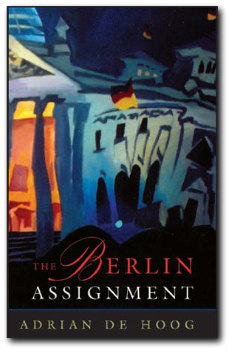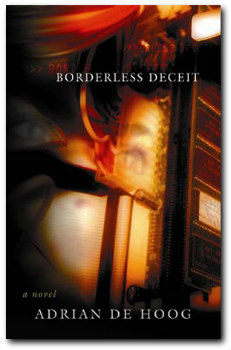
HOMEWesley Britton’s Books,
|
Spies on FilmSpies on Television & RadioSpies in History & LiteratureThe James Bond Files |
|
Spies in History & Literature ~ Spy Fiction à la
Canadienne – The Novels of Adrian de Hoog
By Mark T. Hooker 
Canadian author Adrian de Hoog Adrian de Hoog, an author from the wide-open prairies and icy-cold of Canada, delivers a fresh, new perspective on the game of espionage in his two novels: The Berlin Assignment (2006) and Borderless Deceit (2007). These are not bang and boom spy thrillers, but are rather novels with spies in them. The Berlin Assignment plays out against the backdrop of post-wall Berlin and the problems of German reunification. Borderless Deceit is the tale of the Canadian role in the intelligence war against illicit weapons trafficking and money laundering that begins with the same kind of cyber attack that was launched on Georgia before the Russians invaded in August 2008. The world of fiction was ahead of the real world on this one. Borderless Deceit came out before the attack became a fact. Both novels share the same story line, which is both an advantage and a disadvantage to the reader. The advantage is that the common story line provides de Hoog more time to develop his excellent psychological portraits of the characters. The disadvantage is that the reader can guess how Borderless Deceit ends before the final chapter is read. The reason that the story lines share so many parallels, explains De Hoog, is that he rather enjoyed constructing the interplay of the story elements when he was working on The Berlin Assignment, but after a number of years passed without the novel finding a publisher, he concluded that “it would never be published and then thought [he] might as well use that structure again.” That is not to say that the one novel is a simple retelling of the other. No. The details of the stories are subtly varied, creating new interesting visions of the same motif. The main attraction of De Hoog’s novels are the people who inhabit them. His visual portraits are economic, but his psychological profiles are detailed and filled with subtle brush strokes. In both the novels, the main show is a search to understand the relationships between the characters. The central characters of the story line are an introverted male lead and an extroverted female lead. The key issue in their relationship is best reflected in one of the questions that the female lead in Borderless Deceit asks herself: “Where lies the line between being alone and being lonely?” (BD p. 179) De Hoog’s novels explore the consequences of crossing this line.  The moral of both stories is perhaps best expressed by a Gorbachev quote found in The Berlin Assignment. When asked what he thinks of the Honecker regime on the eve of the fall of the Berlin Wall, Gorbachev replies, “History punishes those who act too late.” (TBA p. 420). In Borderless Deceit, the heroine connects loneliness and time when she tells the male lead that “you suffered from some form of monomania and the tragedy is you allowed it to waste precious years.” (BD p. 317) For the heroine, time is fleeting, but “good memories are the return on an investment of time,” and she already has had a good return on her investment in her Vienna years. (BD p. 173) To the contemplative reader, the clear implication of her conclusion is that the male lead has invested unwisely. The element of espionage comes into play in both novels in the attempts of outsiders to understand the complex relationships of the two leading characters. When viewed in a certain light, their relationships have all the makings of a spy drama. Thanks to the narrator, however, the reader knows the “truth” of these relationships, making the outsiders' efforts to uncover the counter intelligence (CI) aspect of the couple’s relationship seem like full-blown cases of paranoia. In The Berlin Assignment, the investigation of the couple’s relationship is set against the backdrop of East Germany’s Stasi past. This backdrop serves to highlight the parallels between the analytical methods and motivations of the Stasi and those of the retiring British Chief of Station in Berlin, who wants a CI coup to close his career and believes that the starring couple of the novel will be it. De Hoog comments on this with subtle indirectness. When the male lead of The Berlin Assignment finishes reviewing his Stasi file, he makes an observation about the great amounts of insignificant detail that fill the file, meticulously kept for year after year. “A Stasi specialty,” says the archivist. “They lacked feedback loops telling them they were on a wild goose chase. Once they started, they couldn’t stop.” (TBA pp. 326, 477) The attentive reader soon sees that the same is true of the British Chief of Station.  In Borderless Deceit, De Hoog has a marvelous characterization of the motivation for continuing to believe the CI analysis of the main characters’ relationship, and for further pursuing an investigation of it. The chief inquisitor is confronted by the female co-star of the novel, who calls his CI analysis “pseudo-intellectual trotting around,” the purpose of which is to “spice up” his “own ego” (BD p. 203). The “wild goose chase that could not be stopped” and the “spice of pseudo-intellectual trotting around” are simply two sides of the same coin. The irony of all this is that the character who defends the male lead in The Berlin Assignment from the witch hunt of the British Chief of Station is the same one, who in Borderless Deceit is leading the witch hunt to spice up his own ego. The exploration of the CI aspects of the leading characters’ relationships leads to the issue of the truth, which is a key one in the shadowy CI world where things are never as they seem. In The Berlin Assignment, the male lead says that Canadians are “selfless white knights, all of us. The truth first, self-preservation second” (TBA p. 436), and it appears so, because the “bad guy” is a Brit. In Borderless Deceit, the actions of the male lead confirm this positive assessment Canadians, and the lead turns into a “knight errant” (BD p. 349). The actions of the chief inquisitor, however, demonstrate that not all Canadians have a good handle on the truth, and that the truth has a certain malleability in some circles. Recommended for those looking for something more than boom and bang in their spy fiction. These are “literary” spy novels that make you think. The Berlin Assignment is especially interesting for its illumination of the social dynamics of post-wall Berlin. Borderless Deceit will appeal to those with an appetite for stories of the intricacies of technical intelligence collection and analysis. A translation of the novels to the silver screen could produce films that would rival The Lives of Others and The Quiet American. I hope that this will not be too long in happening. Visit the books’ websites at ~ The Berlin Assignment
Adrian de Hoog’s novels are available in bookstores everywhere, as well as these online merchants ~
Amazon U.S.
|